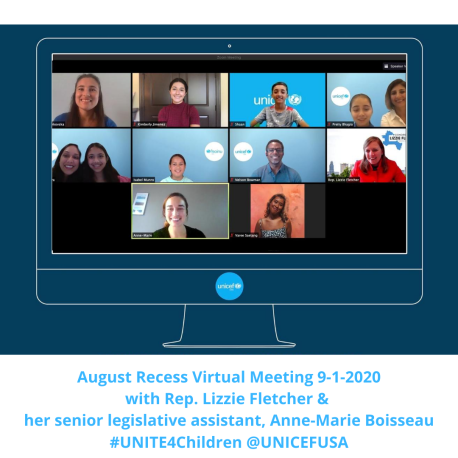
When Kids in Houston Needed Help Quickly, The Bridge Fund Stepped In
After a crisis, children may not only be recovering from injuries or the loss of family and their homes, they may also be deeply scarred by other disruptions in their lives. As Lisa Szarkowski, UNICEF USA's Vice President, Humanitarian Emergencies and Executive Communications, explains: "Trauma is as destructive as floodwater. It can freeze a child’s brain and keep her locked in survival mode for life, stunting neurological development."

After Hurricane Harvey slams into Texas, hundreds of residents of Twin Oaks Village, near Houston, struggle to reach dry land. © Robert Gauthier/Los Angeles Times (via Getty Images)
Fortunately, the familiar environment of the classroom can be a locus of comfort and healing. That is why, within 72 hours of an emergency, UNICEF seeks to place children in group educational settings. Learning is one benefit, of course. But, for a child’s psychological health and neurological development, a rapid return to normality is essential.
After a crisis, children may not only be recovering from injuries or the loss of family and their homes, they may also be deeply scarred by other disruptions in their lives.
The connection between stress and impaired development in children led UNICEF to develop a culturally and age-appropriate tool kit for psychosocial support to boost resiliency. UNICEF fosters community capacity to support children and families during and after emergencies, while organizing child-friendly spaces where affected communities and children can find support. For children with behavioral issues, who may need extra support, UNICEF provides referrals to appropriate mental health networks.
Training Teachers to Provide Psychosocial Support
Unfortunately, Hurricane Harvey, one of the worst natural disasters in U.S. history, caused record rainfall and flooding in the greater Houston area, home to three million children. Hurricane Harvey damaged 200 educational facilities and left 100 more inaccessible, preventing more than 1 million children in the Houston area from starting school and dissipating stress in the safety of the classroom.
UNICEF USA, in partnership with local organizations and experts from UNICEF, mobilized so that the most vulnerable children in Houston could rapidly return to the classroom. UNICEF and UNICEF USA advised local authorities to help reach the most vulnerable children in the aftermath of the storm.
In the aftermath of Hurricane Harvey in Houston, UNICEF USA helped provide materials to enable the most vulnerable children in the Houston area return to school as quickly as possible.
Support included training educators to identify and respond to signs of distress among children, and help traumatized children get the support they need. In addition — as part of the Bridge Fund’s accelerated funding after Hurricane Harvey — UNICEF USA is supporting Rice University’s Baker Institute for Public Policy and other local partners to train more than 2,200 parents and caregivers of children under the age of 6 in an ageappropriate, psychosocial support curriculum, developed by the National Child Traumatic Stress Network.
In turn, these parents and caregivers, trained to recognize signs of trauma and stress, will reach at least 3,375 young children with an evidence-based, mental health intervention. The Bridge Fund’s accelerated funding supported a timely enhancement of parental and caregiver capacity. This funding is helping the youngest and most vulnerable children cope with upheaval, ensuring they can return to a normal childhood free of the disabling neurological complications of stress as quickly as possible.
First Money To Houston From UNICEF USA
UNICEF USA made use of UNICEF’s technical expertise in emergency response to identify other strategies that would most effectively address vulnerable children’s needs, too. That was why the Bridge Fund accelerated the first of UNICEF USA’s funding deployed to Houston to support housing-related and medical emergency relief for marginalized children and their families.
For those dependent on hourly wage earners, household incomes were threatened. UNICEF USA funded a local partner that was able to provide 100 families, in its refugee resettlement care program, with significant rental assistance. UNICEF USA also ensured essential medical services and supplies were available in clinics serving low-income and immigrant communities, including 1,200 vulnerable children.
Learn more about the UNICEF USA Bridge Fund.
Top photo: In the aftermath of Hurricane Harvey, two children, forced from their homes by flooding, chat in a shelter in the Houston area. © Associated Press
HOW TO HELP
There are many ways to make a difference
War, famine, poverty, natural disasters — threats to the world's children keep coming. But UNICEF won't stop working to keep children healthy and safe.
UNICEF works in over 190 countries and territories — more places than any other children's organization. UNICEF has the world's largest humanitarian warehouse and, when disaster strikes, can get supplies almost anywhere within 72 hours. Constantly innovating, always advocating for a better world for children, UNICEF works to ensure that every child can grow up healthy, educated, protected and respected.
Would you like to help give all children the opportunity to reach their full potential? There are many ways to get involved.





